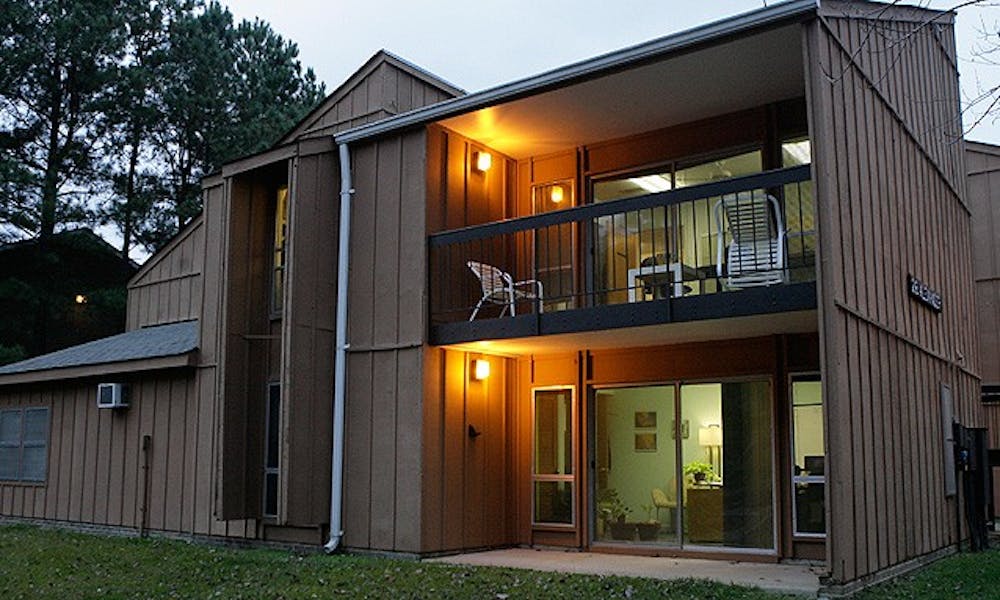Additional juniors returning from abroad can join their peers living off-campus, following a second wave of housing exemptions granted by Residence Life and Housing Services.
Ninety-nine more students have been released from the University’s three-year housing requirement, Linda Moiseenko, manager for Duke community housing, wrote in an e-mail Tuesday. These students were notified of their release via e-mail in mid-Novemeber and were among the original 220 students who applied for off-campus housing earlier in the Fall. Only 66 students were initially issued exemptions in October.
University housing policy mandates that RLHS fills all on-campus beds before granting off-campus housing privileges to juniors looking to live off-campus in the Spring. The number of students living on campus next semester has fluctuated, allowing RLHS to grant more exemptions to juniors abroad, said Vice President for Student Affairs Larry Moneta.
“There’s always a meltdown over the course of the semester,” he said. “People made last minute decisions whether regarding medical withdrawals, academic withdrawals or Spring study abroad. Throughout the semester, there are always some changes which permit more students to be exempt.”
Moneta called the existing housing process “pretty dynamic,” adding that Duke’s large residential student body makes changes inevitable.
Moiseenko added that RLHS officials’ decision to grant more exemptions was partly influenced by accommodation.
“RLHS has several variables to track, which impact the number and configuration of bed spaces available for the [Spring],” she said. “In attempting to meet the needs of on-campus students and students returning to campus, RLHS determined that additional release was necessary.”
Yet even with the additional exemptions, fewer juniors were released this year than in previous years. Last year, all students who applied for off-campus housing received it, said Campus Council President Stephen Temple, a senior.
An increased number of available beds on campus combined with the fact that graduate students are not required to live on Central Campus threatens the “cultural norm” that promotes off-campus living for juniors in their second semester, Temple said.
“It’s not a change in policy [that’s needed], it’s a change in expectations,” he said.
At its Nov. 4 meeting, Campus Council recommended a policy to RLHS that aims to give students more reasonable expectations when it comes to off-campus housing. The policy recommends RLHS conduct a Spring lottery for students who wish to apply for off-campus housing. This would help students roughly gauge whether they have a good chance at living off-campus, depending on their lottery numbers.
“Someone with a higher lottery number would be almost guaranteed to not get [off campus housing] as opposed to someone with lottery number one,” Temple explained. “It’s a whole lot better than nobody having any idea before going into the system before they go abroad.”
And although unsatisfied expectations caused problems for students denied in October, the sudden second wave of releases caused even more inconvenience said Kim Solow, a junior who was released from the housing contract Nov. 15.
“When we didn’t get off campus we [thought] ‘whatever,’ but when we had to go back to those places and try to reopen our contracts, that was difficult,” she said.
Solow, who had been studying abroad in India, was slated to live in a two bedroom in the Belmont Apartments. She withdrew her application after RLHS notified her that she did not receive off-campus housing. When Solow was released form her contract, the Belmont apartment was no longer available. Solow will now be living in West Village Apartments, which have reached capacity, she said.
“I understand that they have costs they have to cover and that we’re contracted to live there for three years, [but] at the same time it sounds like [RLHS] made a huge mistake in keeping so many people. Most of the people I know were released, which just made it more difficult.”
Heather Brown, assistant manager at West Village, said although the new releases did not hurt West Village financially, it did cause many students to lose their first or second choice apartments. Brown added that West Village was “lucky” this year in that it still had enough two bedroom apartments available for the four or five contracts that returned in November.
“[Students] got apartments they just didn’t get their first choice, which is unfortunate because the whole point of putting money down early is getting the best apartment,” she said.
The administration has no plans to change the three-year housing requirement, said Steve Nowicki, dean and vice provost of undergraduate education. He added that this policy is what makes Duke unique, and that the introduction of the house model will bring even more value to Duke’s distinct residential community.
“Duke is a residential university—that’s not an arbitrary fact about Duke, it’s an intentional fact that recognizes the importance of not just synergistic learning but of living,” he said. “If you choose to come to Duke, part of that is understanding it’s a residential experience.”
As more on-campus housing becomes available or is added, it is less likely people will be released, especially with the completion of K4 in Spring 2012, Moneta said.
“I keep reminding people [to] not presume any releases, that’s just the luck of the draw,” he said.
Get The Chronicle straight to your inbox
Signup for our weekly newsletter. Cancel at any time.

